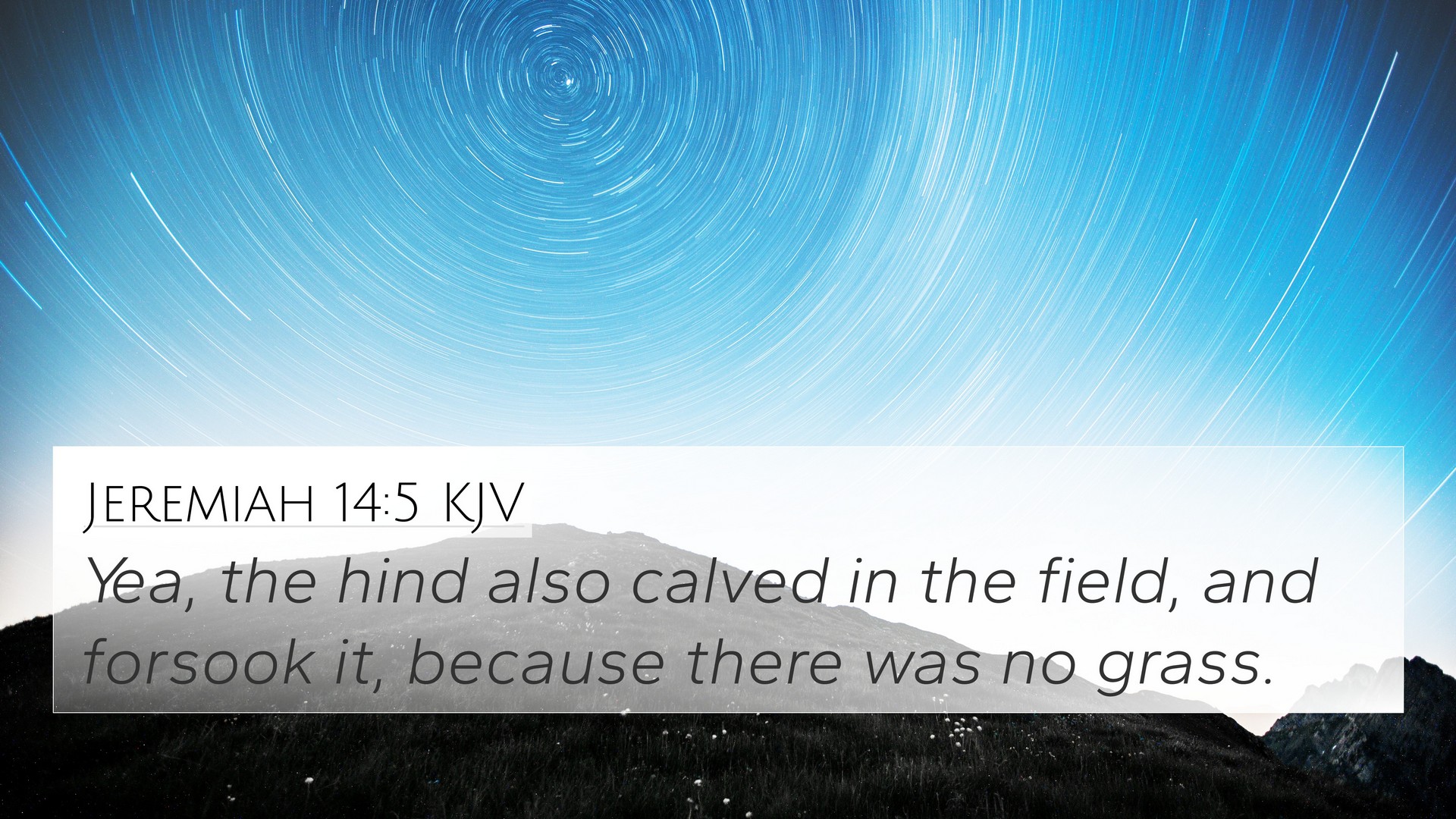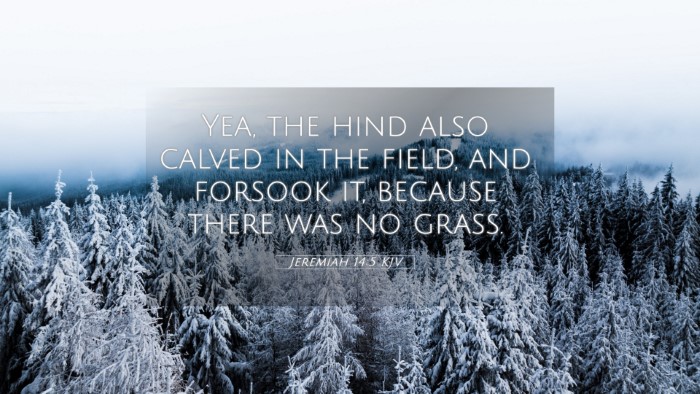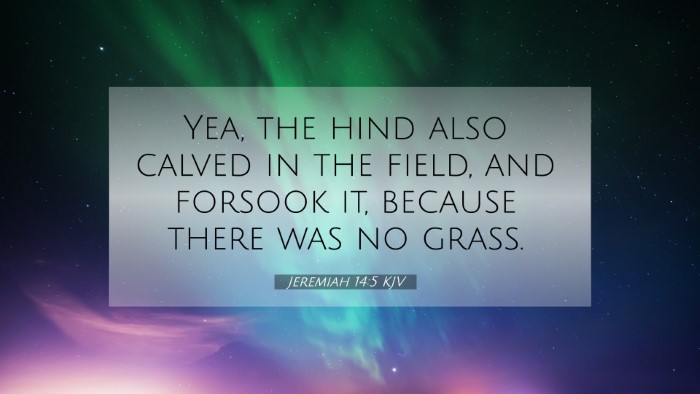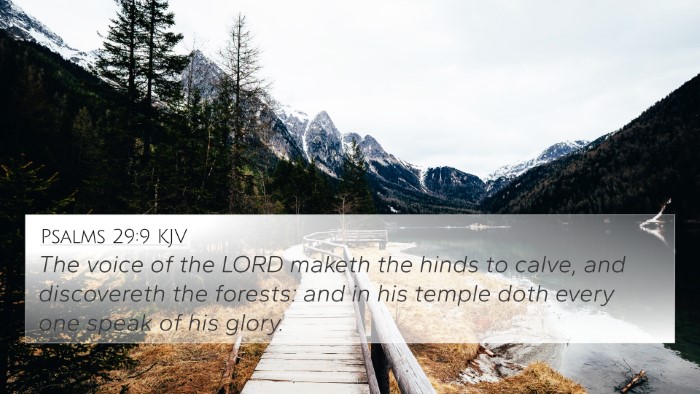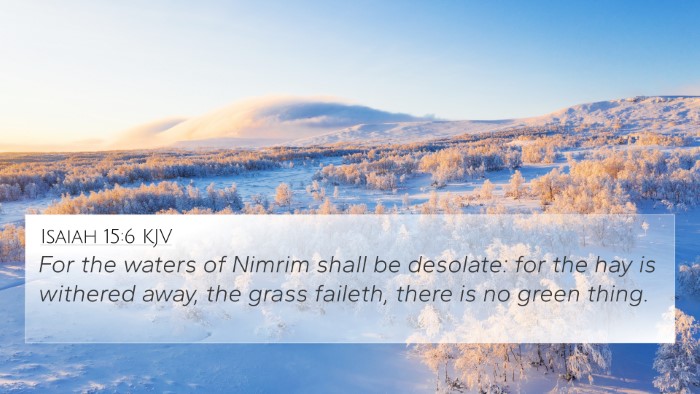Understanding Jeremiah 14:5
Jeremiah 14:5 states, "Yea, the hind also calved in the field, and forsook it, because there was no grass."
Summary of Meaning
This verse reflects the dire situation faced by the people of Judah during a time of severe drought. The imagery of the hind (female deer) abandoning her calf due to the lack of grass illustrates a profound sense of desperation and abandonment, not just in nature but symbolically for the people themselves. It indicates the severe impact of environmental conditions on both wildlife and humanity, emphasizing the deep suffering experienced during times of scarcity.
Commentary Insights
Insights from Matthew Henry, Albert Barnes, and Adam Clarke shed light on the broader implications of this verse:
-
Matthew Henry: He notes that the hind’s forsaking her calf signifies a breakdown of natural order due to sin and divine judgment. In this instance, the lack of grass represents spiritual barrenness, where God’s blessings are withdrawn because of the people's unfaithfulness.
-
Albert Barnes: Barnes discusses the metaphorical implications of the hind and calf as symbols for Israel and her relationship with God. The forsaking of the calf reflects how God’s people have also abandoned their responsibilities due to adverse circumstances, which stem from their disobedience.
-
Adam Clarke: Clarke emphasizes the emotional weight of the verse, suggesting that the abandonment by the hind signifies a deep sorrow paralleling the experiences of the Israelites. It serves as a reminder of God's judgment upon the land and the people for their spiritual apathy.
Connections between Bible Verses
To gain a deeper understanding of Jeremiah 14:5, it can be helpful to explore related Bible verses:
- Isaiah 1:3 - "The ox knows his owner, and the ass his master's crib: but Israel does not know, my people do not consider." This verse emphasizes Israel's ignorance of their spiritual state.
- Hosea 4:6 - "My people are destroyed for lack of knowledge: because you have rejected knowledge, I will also reject you." It warns of the consequences of turning away from God.
- Jeremiah 12:4 - "How long shall the land mourn, and the herbs of every field wither?" This verse parallels with the mourning expressed in Jeremiah 14:5 regarding environmental and spiritual desolation.
- Psalms 42:1 - "As the hart panteth after the water brooks, so panteth my soul after thee, O God." The longing represented evokes the theme of spiritual thirst and longing for sustenance.
- Matthew 6:26 - "Behold the fowls of the air: for they sow not, neither do they reap, nor gather into barns; yet your heavenly Father feedeth them." It emphasizes God's provision despite dire circumstances.
- Proverbs 27:23 - "Be thou diligent to know the state of thy flocks and look well to thy herds." Encourages awareness of one’s spiritual and temporal conditions.
- Revelation 7:17 - "For the Lamb which is in the midst of the throne shall feed them, and shall lead them unto living fountains of waters." It signifies future hope and restoration provided by God.
Thematic Connections
The themes of abandonment, divine judgment, and spiritual hunger connect Jeremiah 14:5 with various biblical motifs:
- The lament of natural creation suffering alongside humanity reflects the broader biblical theme of creation’s groaning (Romans 8:22).
- The emotional distress of both animals and people due to lack of provision highlights the covenant relationship and the consequences of breaking it (Deuteronomy 28:15).
- The imagery of animals symbolizing people is recurrent in Scripture, illustrating the intimate connection between creation and Creator.
- The call to return to God amid distress is echoed through many prophetic texts, urging repentance (Joel 2:12-13).
- Covenantal fidelity is reiterated throughout Scripture, making this verse significant in ongoing discussions of Israel’s relationship with God.
Tools for Bible Cross-Referencing
Exploring Bible verses related to Jeremiah 14:5 can be enhanced through various tools and methods:
- Bible Concordance: This tool aids in finding specific keywords found within the scriptures, facilitating discovery of relevant verses.
- Bible Cross-Reference Guide: Guides can help connect themes and narratives across different books of the Bible.
- Cross-Reference Bible Study: This method allows for a comparative analysis of biblical themes and teachings, promoting deeper insight.
- Comprehensive Bible Cross-Reference Materials: These resources provide extensive lists of verses that correspond to particular themes, assisting in research.
- Bible Chain References: A methodology that links verses together, fostering an interwoven understanding of biblical texts and themes.
User Intent Keywords and Their Relevance
When exploring specific user intents regarding Jeremiah 14:5, several relevant queries and connections may arise:
- What verses are related to Jeremiah 14:5? This question directs users to explore related themes of abandonment and judgment.
- Find cross-references for Jeremiah 14:5: Encourages the study of various scriptures that illuminate the meanings and themes present in this verse.
- How do Jeremiah 14:5 and Isaiah 1:3 connect? This comparative analysis reveals the common themes of ignorance and abandonment among God's people.
- Similarities between Jeremiah 14:5 and Hosea 4:6: Both express a lament for lack of knowledge and provision among God's people.
- Bible verses that support Jeremiah 14:5: Encourages exploration of the supportive verses that underline the spiritual themes present in this scripture.
Concluding Thoughts
In conclusion, Jeremiah 14:5 serves as a poignant reminder of the consequences of spiritual neglect and the longing for restoration. By cross-referencing and exploring related biblical verses, we can deepen our understanding of this scripture, thus enhancing our spiritual journey and commitment to God's ways.
